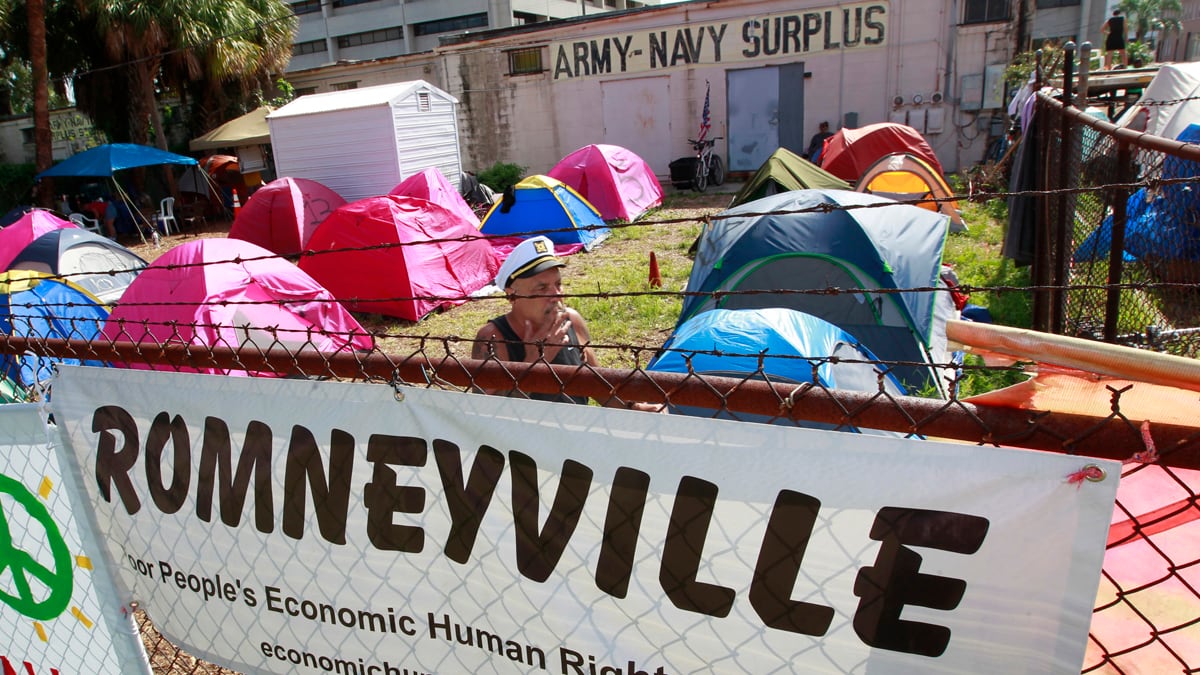As news hit that Tropical Storm Isaac had delayed the Republican National Convention, about 60 protesters milled around their tents in muggy downtown Tampa under a cloudless sky waiting to let their collective voice be heard by the world.
They call their tent city Romneyville, a play on the Hoovervilles, shantytowns of the Great Depression. The encampment was established last month by a local homeless advocacy group, the Poor People’s Economic Human Rights Campaign. It sits in a vacant lot just off an interstate ramp behind an army-navy surplus store.
In the past week activists from around the nation have trickled in and joined the ranks of local homeless protesters. John Penley, a longtime East Village anarchist activist who helped organize Occupy Wall Street protests in New York, holds court at the media information tent. Diamond Dave Whitaker, a self-professed beatnik of the San Francisco Rainbow Coalition scene, takes a break on a mattress from preparing meals outside a beat-up former school bus.
Penley said an estimated 600 Occupy protesters from New York are anticipated to join them, but Isaac has thrown a monkey wrench into the plans of protesters as well as those of convention organizers.
Elsewhere in Tampa Bay, protesters gathered to reassess plans. They shared methods of civil disobedience and discussed legal rights. The feminist antiwar group Code Pink prepared a banner of vaginas and costumes to match. A person in a furry panda suit with a giant A, an anarchist symbol, called herself a Pandorist and greeted passersby in historic Ybor City—although few delegates appeared to visit the bohemian nightlife district.

All might seem playful and rather innocent, but in light of mass arrests and property destruction at past political conventions and World Trade Organization conferences, law enforcement and the city of Tampa aren’t taking any chances. And cost isn’t a worry. Like Charlotte, site of the Democratic National Convention, Tampa received $50 million in federal funds to secure the city.
Tampa bought high-tech security cameras, radios, body armor, bicycles, an armored tank, and other measures that they will not detail citing security reasons. The city established protest zones and passed an ordinance that bans everything from water pistols to anything that can protect the face against noxious fumes to protest marches that last more than 90 minutes. Given that a state law prevents local governments from enacting gun control, licensed gun owners are still allowed to carry even in protest zones.
On Saturday evening, police in tan uniforms bicycled around Romneyville. Police cars loaded with bicycles lined downtown streets as more officers arrived for duty. More than 3,500 law-enforcement officers from around the state are scheduled to work the event as well as 1,700 National Guard troops.
Tampa Police Chief Jane Castor has stated repeatedly that the city’s intent is ensure people’s right to free speech and avoid confrontations between police and protesters that might end up airing on the 6 o’clock news. The city also wants to avoid lawsuits; more than 800 protesters were arrested during the 2008 RNC convention in St. Paul, Minn., and 1,800 in 2004 in New York, resulting in many judgments against both cities.
But veteran protesters like Penley have their doubts. “I’ve heard that before,” Penley said. “I’ll make that determination after it’s over.”
Local authorities report there have been veiled threats and discovered bricks and pipe near an anti-tyranny graffiti image of the Guy Fawkes mask on the rooftop of a Tampa building on Tyler Street. Police suspect the tools were intended for use as weapons by anarchists during the RNC. Police spokeswoman Laura McElroy said it is an active investigation and no arrests have been made.
Meanwhile, CNN and Fox news reported that the FBI and Department of Homeland Security issued a warning based on an informant tip that extremists from New York were planning to tie up bridges during the RNC to prevent delegates from reaching the convention center. As a result, The Coast Guard is restricting boat travel around 15 bridges and announced potential searches of docked vessels. No small measure in a waterfront city.
Making security more difficult is that the majority of the delegates aren’t staying in downtown Tampa, because there aren’t enough hotel rooms. The RNC leased 450 buses to shuttle delegates between hotels as far as 30 miles away to the convention center. About one third of the delegates are staying across Tampa Bay on the peninsula that is Pinellas County. Many of those are housed along the outlying string of barrier islands and will be bused across multiple bridges.
Given that Tampa may experience high winds from Tropical Storm Isaac, the bridges present an additional risk. “They decided to err on the side of caution,” Castor said Saturday night, referencing the decision to cancel Monday’s events. “Transporting everyone in the driving rain across bridges and rearranging routes is not a good situation.”
The heavy thunderstorms predicted for Tampa are expected to ease sometime Tuesday. In the meantime, Castor says, “they decided to let everyone sit back on Monday and wait.” She adds jokingly, “They can enjoy a hurricane party.”
But protesters are sticking to their plans to demonstrate despite the weather. The first march will be held Sunday at the RNC welcoming event for delegates and journalists at Tropicana Field in St. Petersburg.
The real test will be in Tampa on Monday during the largest planned protest of the week, resistRNC, joining unions, antiwar activists, environmentalists, feminist groups, and more. Several other groups said they plan to march during the week without a permit. “We don’t feel we should have to file for a permit, because it is our right to do these things,” said the Rev. Bruce Wright, head of Poor People’s Economic Human Rights Campaign.
McElroy said the police won’t necessarily arrest protesters in unpermitted marches. “We recognize there may be spontaneous protests, and we are prepared to handle them. It will be case by case. We have to balance those who want to drive on those roads with protesters who want to march there.”
Of course, if Tropical Storm Isaac ends up closer to Tampa, protesters and conventioneers could find themselves bunking together, Penley jokes. In the event of storm evacuations, the convention center serves as one of the city’s public shelters.






